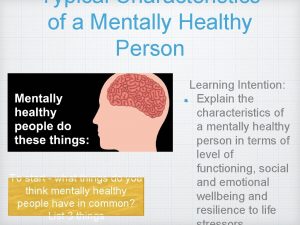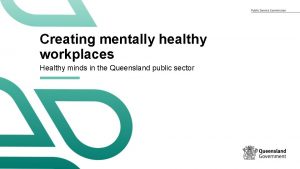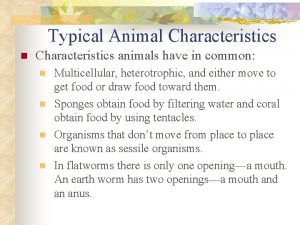Typical Characteristics of a Mentally Healthy Person To











- Slides: 11

Typical Characteristics of a Mentally Healthy Person To start - what things do you think mentally healthy people have in common? List 3 things Learning Intention: Explain the characteristics of a mentally healthy person in terms of level of functioning, social and emotional wellbeing and resilience to life

Characteristics Although there are individual differences in regards to mental health, mentally healthy people tend to have the following in common: High level of functioning social and emotional wellbeing resilience to life stressors

High Level of Functioning generally refers to how well an individual independently performs or operates in their environment. Like mental health, functioning can be represented on a continuum.

High level of functioning interpersonal relationships - e. g… school and work/occupational settings e. g… leisure and recreational activities - e. g… daily living skills - e. g… cognitive skills - e. g…. emotions - e. g…

High level of functioning Mentally healthy people tend to have a high level of functioning in most of the previous areas. Adaptive behaviour involves actions that enable a person to effectively carry out their everyday tasks - they are able to adapt to the demands of everyday living. Maladaptive or dysfunctional behaviour interferes with a person’s ability to carry out their usual tasks in an effective way.

High levels of social and emotional wellbeing Wellbeing refers to our sense of wellness or how well we feel about ourselves and our lives. A mentally healthy person tends to have a high level of both social and emotional wellbeing.

Social Wellbeing Social wellbeing refers to our ability to have satisfying relationships and interactions with others. A person with a high level of social wellbeing is likely willing and able to: develop and maintain healthy relationships with family and friends socially interact with others in appropriate ways respect and understand other individuals respect the cultural identities of others competently resolve conflicts with others effectively manage unhealthy relationships spend time with loved one feel self-confident alone or with others

Emotional Wellbeing Emotional wellbeing is our ability to control emotions and express them appropriately and comfortably. A person with a high level of emotional wellbeing is likely to be willing and able to: develop awareness and understanding of their own emotions regulate their emotions express a range of emotions in a suitable manner identify emotions in others and empathise have a positive attitude about emotions take on challenges and take risks take responsibility for their actions accept mistakes or setbacks and learn from them

Resilience to life stressors Resilience is the ability to cope with and adapt well to life stressors and restore positive functioning. People who are mentally healthy tend to have high levels of resilience. Mentally healthy people are more likely to have resilience to life stressors because they are likely to perceive the stressor as an opportunity to excel because they have the resources to cope.

Resilience to life stressors Resilience is not necessarily an uncommon characteristic. It is the product of personal skills and is significantly influenced by external factors, particularly our social connections and access to social support.

Reflection and Homework Design a questionnaire that a psychologist could use to determine whether or not an individual is mentally healthy. Complete learning activity 11. 3 questions 1 c and 3 e.
 Characteristics of mentally healthy person
Characteristics of mentally healthy person Characteristics of mentally healthy person
Characteristics of mentally healthy person Mutilomania
Mutilomania 1. person plural
1. person plural Speaking in third person examples
Speaking in third person examples Person person = new person()
Person person = new person() Example of personal pronoun
Example of personal pronoun Healthy food healthy mind journal
Healthy food healthy mind journal Healthy soil healthy life poster ideas
Healthy soil healthy life poster ideas Healthy forests healthy communities poster contest
Healthy forests healthy communities poster contest Healthy nurse healthy nation
Healthy nurse healthy nation Typical vertebra diagram
Typical vertebra diagram




















